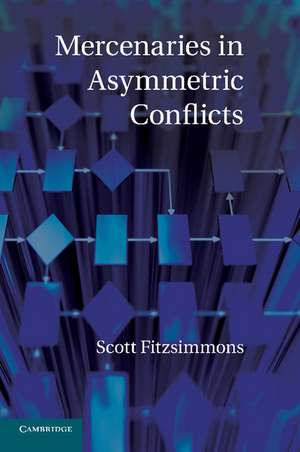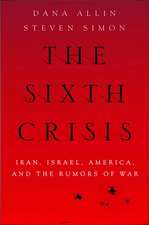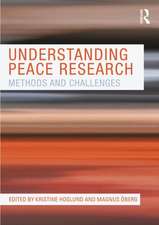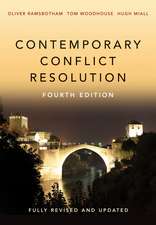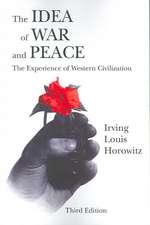Mercenaries in Asymmetric Conflicts
Autor Scott Fitzsimmonsen Limba Engleză Paperback – 5 mar 2014
| Toate formatele și edițiile | Preț | Express |
|---|---|---|
| Paperback (1) | 282.28 lei 6-8 săpt. | |
| Cambridge University Press – 5 mar 2014 | 282.28 lei 6-8 săpt. | |
| Hardback (1) | 707.26 lei 6-8 săpt. | |
| Cambridge University Press – 23 sep 2012 | 707.26 lei 6-8 săpt. |
Preț: 282.28 lei
Nou
Puncte Express: 423
Preț estimativ în valută:
54.03€ • 56.16$ • 44.75£
54.03€ • 56.16$ • 44.75£
Carte tipărită la comandă
Livrare economică 04-18 februarie 25
Preluare comenzi: 021 569.72.76
Specificații
ISBN-13: 9781107679771
ISBN-10: 110767977X
Pagini: 344
Ilustrații: 2 b/w illus. 8 tables
Dimensiuni: 152 x 229 x 18 mm
Greutate: 0.46 kg
Editura: Cambridge University Press
Colecția Cambridge University Press
Locul publicării:New York, United States
ISBN-10: 110767977X
Pagini: 344
Ilustrații: 2 b/w illus. 8 tables
Dimensiuni: 152 x 229 x 18 mm
Greutate: 0.46 kg
Editura: Cambridge University Press
Colecția Cambridge University Press
Locul publicării:New York, United States
Cuprins
1. The normative theory of military performance; 2. Neorealist combat balance theory; 3. 5 Commando puts down the Simba Rebellion; 4. Callan's mercenaries are defeated in Northern Angola; 5. Executive outcomes defeat UNITA; 6. The White Legion abandons Zaire; 7. Conclusion.
Recenzii
“While much has been written on the impact of mercenary forces on colonial and post-colonial wars, Mercenaries in Asymmetric Conflict is special in that it unveils a new explanation of why mercenary groups often win against more numerous and better-equipped opponents. Looking through the lens of competing constructivist and neorealist theories of military efficiency this impressive work demonstrates how mercenary forces that strongly emphasise behaviour norms associated with military performance will display massively superior tactical competency than forces which ignore these norms. This scholarly book should be of great interest to academics and practitioners alike as it sets out to explore new lines of inquiry on a very important subject.” – Dr. Christopher Kinsey, Reader in Business and International Security, Defence Studies Department, King’s College, London
“Scott Fitzsimmons’s book takes us back to the world of mercenary warfare, a field that has been under-researched for a long time. The difference these actors make in asymmetric wars and the conditions that determine their performance are important, fascinating, and timely problems. In his clear and precise analysis, Fitzsimmons goes well beyond the conventional and prejudiced picture of the greedy and bloodthirsty soldier of fortune. His investigative analysis unpacks mercenary military culture, thus significantly extending our knowledge of these actors’ behavior and performance. Not only will his accessible work be highly beneficial to academics, but its implications are also of interest to policy makers.” – Dr. Ulrich Petersohn, Senior Researcher, ETH Zurich
“Fitzsimmons effectively casts aside the common state-centricity in international relations theory to give mercenary groups their due treatment. In so doing, he usefully adds to the ongoing conversation between neorealism and constructivism. What is more, his well-structured and rich empirical study provides the reader with a framework to contemplate the larger and growing phenomenon of armed non-state actors on the world stage.” – Dr. Christopher Spearin, Department of Defence Studies, Canadian Forces College
“Scott Fitzsimmons’s book takes us back to the world of mercenary warfare, a field that has been under-researched for a long time. The difference these actors make in asymmetric wars and the conditions that determine their performance are important, fascinating, and timely problems. In his clear and precise analysis, Fitzsimmons goes well beyond the conventional and prejudiced picture of the greedy and bloodthirsty soldier of fortune. His investigative analysis unpacks mercenary military culture, thus significantly extending our knowledge of these actors’ behavior and performance. Not only will his accessible work be highly beneficial to academics, but its implications are also of interest to policy makers.” – Dr. Ulrich Petersohn, Senior Researcher, ETH Zurich
“Fitzsimmons effectively casts aside the common state-centricity in international relations theory to give mercenary groups their due treatment. In so doing, he usefully adds to the ongoing conversation between neorealism and constructivism. What is more, his well-structured and rich empirical study provides the reader with a framework to contemplate the larger and growing phenomenon of armed non-state actors on the world stage.” – Dr. Christopher Spearin, Department of Defence Studies, Canadian Forces College
Notă biografică
Descriere
Fitzsimmons argues that small mercenary groups must maintain a superior culture to successfully engage and defeat larger and better-equipped opponents.
